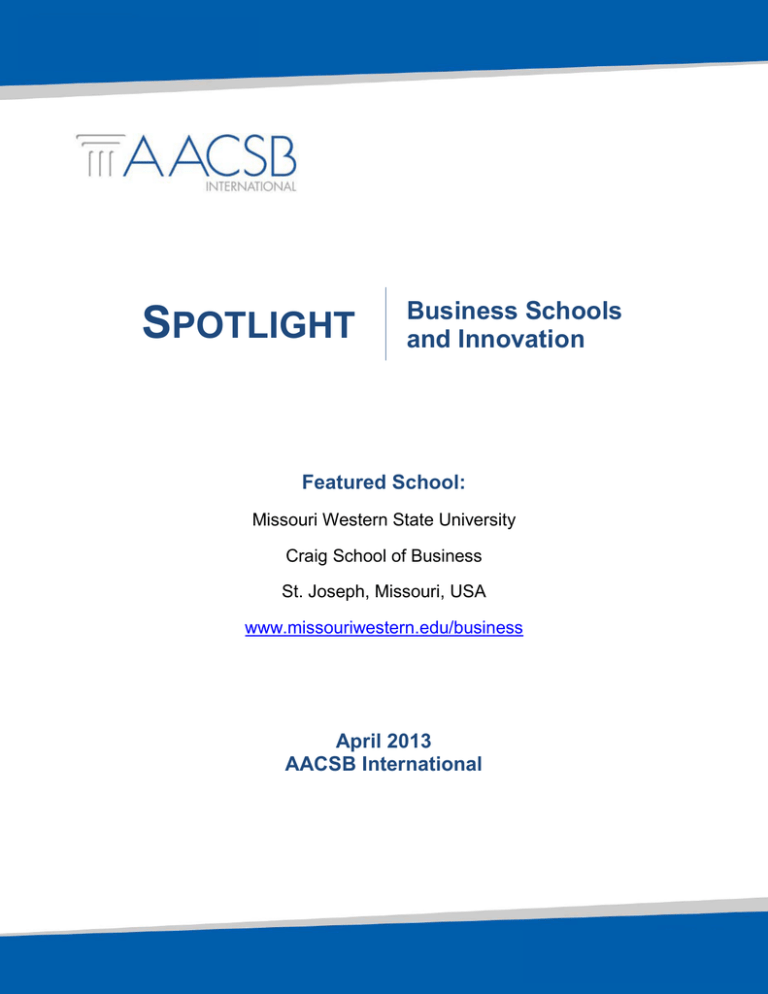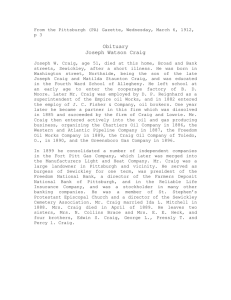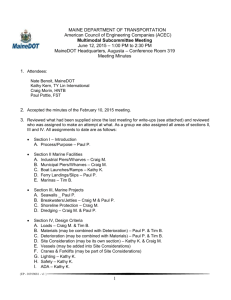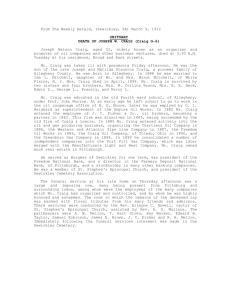
SPOTLIGHT
Business Schools
and Innovation
Featured School:
Missouri Western State University
Craig School of Business
St. Joseph, Missouri, USA
www.missouriwestern.edu/business
April 2013
AACSB International
SPOTLIGHT | Business Schools & Innovation
Craig School of Business | 2
Craig School of Business and Rocky Mountain Chocolate Factory Partnership
For many business majors, being awarded with a business to operate and manage, right after graduating
from college would present the chance of a lifetime – an entrepreneur’s dream come true. Furthermore,
having access to the professional expertise, support, and networks of business school faculty as well as
other successful entrepreneurs, would be the icing on the cake. For business students, and now alumni,
of the Craig School of Business at Missouri Western State University (MWSU), that dream is a reality, and
the cake happens to be chocolate.
Background
The partnership between the Craig School of Business and the Rocky Mountain Chocolate Factory
(RMCF) began in May 2008 when Steve Craig announced a donation to the school, establishing the
Craig School of Business (CSB). Craig’s gift came with a caveat, requesting that the school work to
expand its entrepreneurial focus and opportunities available to its students. Craig, who is the chief
executive officer of Craig Realty Group in California, grew up in the St. Joseph, Missouri area, and
attributes much of his successful career to the opportunities he was provided with during his college
experience: “Students need these opportunities and should be encouraged to get into business as soon
as they graduate,” he shared.
After discussions with the university, it became evident that the faculty and administrators at MWSU
shared his perspectives on providing the support – financial, experiential, and personal – to talented
business graduates. Through his business connections with the RMCF franchise, and support from Frank
Crail, RMCF chief executive officer, Craig and Greg Pope, RMCF senior vice president of franchise
development, discussed granting students the opportunity to own and manage their own RMCF store.
They believed this would help prepare and encourage more young business leaders to pursue
entrepreneurship and reach business success sooner.
After six months of drafting and planning the curriculum and objectives of this venture, the business
schools’ administration, faculty, and Craig created an Applied Entrepreneurship class in the Spring of
2009. Students who sign up for the course compete to win ownership of an RMCF store, at the
conclusion of the course.
How the Program Works
Between six and ten qualified students participate in the class and store competition each semester. To
qualify, an individual must either be a graduating senior or a business major alumnus, have positive
© AACSB International. All Rights Reserved.
SPOTLIGHT | Business Schools & Innovation
Craig School of Business | 3
references, and a minimum 2.5 cumulative GPA. Dave Shinneman, volunteer and chair of the CSB
Advisory Council's Entrepreneurship Committee explains the screening process: “Students create a
business plan and present to an initial panel that evaluates the students’ plan, their level of financial
awareness, and enthusiasm for the program, as well as probe the students’ success as entrepreneurs
beyond being owners of their first store.” The panel also provides feedback to students on how they could
improve their business plan and its delivery. Finalists move on to a final screening conducted by a
different panel comprised of Craig, Frank Crail, Casey Crail, RMCF liaison to MWSU RMCF store owners,
faculty, business executive volunteers, and current store owners. Students are ranked and the top
candidates are awarded with stores. Since 2010, multiple stores have been offered to each class. The
CSB Advisory Council’s Entrepreneurship Committee evaluates which stores have the strongest potential
to be successful. The first place student winner gets first choice in deciding which store he/she would like
to take over. The number of student winners depends on the number of stores offered during that
semester. After winning the competition, students attend an eight-day intensive training class in Durango,
Colorado, at the RMCF headquarters and then take ownership of their new stores.
Mike West, CSB faculty member and instructor of the Applied Entrepreneurship class, explains that
“learning grows exponentially when students face the possibility of business ownership.” Further, students
are provided with operational support by the faculty and Craig. For example, the accounting faculty will
help students set up payroll and accounting software; other faculty will provide students with the legal and
regulatory compliance preparation they will need. Considering most students are recent graduates with
no experience running a business, the support system they are provided with is crucial.
The winners have five years to repay the store loans they are awarded. The program’s first store owner,
1
Seth Lyons, had paid back his loan in less than three years , and had run his store at 25 percent ahead in
its first year compared to the preceding five years under previous ownership. The first store’s success
prompted RMCF to expand this opportunity to more students each semester, subsequently opening more
stores in multiple locations across the U.S. In 2011 three stores were awarded to students, with all stores
performing successfully and with business performing at greater volumes than in previous years. In
December 2012, two of the student stores were ranked in the top 20 percent of all RMCF stores in the
U.S.; and for that franchise year (2012), all student stores found themselves in the top two-thirds of best
performing RMCF stores.
Craig explains that the main goal of the program is getting graduates into business ownership and
operation sooner and “propelling them into more entrepreneurship opportunities as they mature.”
Ownership of an RMCF store “is only the first step, not the final.” Some students have already taken
advantage of some of the opportunities presented to them through their experiences with RMCF. Lyons
© AACSB International. All Rights Reserved.
SPOTLIGHT | Business Schools & Innovation
Craig School of Business | 4
has already purchased an additional store, and other store owners are following suit, either in the process
of launching additional stores or other businesses.
Challenges
“We know of no other schools with similar programs,” says Craig, “Its success wouldn’t be possible
without the support and dedication from the faculty, volunteers, and administrators.” Along with such a
unique program, come certain challenges. Prior to launching the program, Craig and members of the
business school thoroughly assessed the risks and potential gains in following through with such an
undertaking. Limited liability companies (LLCs) were created that protected students from personal
financial risks. No direct university capital has been granted to the students. Craig and the school had to
rely on their own networks to acquire the funds needed to buy new equipment and build out the stores.
The stores’ landlords have shown to be helpful in this area as well, by often times reducing the store rent
for students for the first two years.
West shares that every semester presents new challenges; but a naturally reoccurring challenge for
faculty lies in effectively identifying which students are best suited for and capable of running a business,
and then adequately equipping them with the skills they will need to be successful. Initially, students did
internships at the RMCF stores before taking ownership. Presently, the RMCF store located in St. Joseph
serves as a facility for training students. CSB faculty member Rick Zimmer adds that the school and
faculty adhere to a continuous improvement process with the program, and assess every semester by
looking at the curriculum being delivered and evaluating what areas were beneficial and where there is
room for improvement or adjustment. Any changes to the program are based off evaluations from prior
semesters. However, the faculty are generally very satisfied with how the program is growing, and
students are exceeding expectations when it comes to their work ethic, maturity, and level of business
acumen in operating the stores.
Success Stories
Currently, there are 12 CSB graduates owning and operating RMCF stores across the nation, and all
have been performing very well in their positions. Two of the stores had been awarded “Rookie of the
Year” award in 2010 and 2011, and as mentioned earlier, some students have already ventured into
operating multiple stores. Store owners are also required to annually contribute five percent of their
store’s profits back to the Craig School of Business, which Craig explains teaches students the
importance of giving back. The donation reflects Craig’s philosophy of never forgetting the origin of one’s
success, which in case of the students, is the Craig School of Business. Many of the owners have gone
beyond this donation and sponsor various events at the business school.
© AACSB International. All Rights Reserved.
SPOTLIGHT | Business Schools & Innovation
Craig School of Business | 5
Leslie Oberg, 2011 CSB graduate and owner of the RMCF store in St. Joseph, credits much of her and
others’ success to the ongoing support offered by the school, faculty, and Craig, as well as the strong
network among other alumni store owners. Store owners will regularly have conference calls with one
another and their RMCF liaisons to discuss the various business issues and challenges they face, and
serve as a resource to one another by sharing best practices, comparing ways of operation, giving
advice, or assisting in setting up new stores. Oberg offers students enrolled in the Applied
Entrepreneurship course the chance to work in her store during the semester in order to build their handson experience and learn what to expect in operating such a business: “They’ll learn the entire business –
customer service, ordering, scheduling, keeping up on the books, and hiring and firing.”
2
As more of these success stories began to circulate and the program began to generate more coverage,
the business school’s alumni began expressing their interest in having such opportunities. Consequently,
in August 2012 Craig and the school decided to expand its applicant pool to business minors at the
Missouri Western State University and CSB alumni. The Applied Entrepreneurship class is now offered in
both fall and spring semesters, which can result in up to six stores being awarded annually. The financing
structure of the stores has changed recently, in that RMCF is assuming the financial function from Steve
Craig. Greg Pope adds that stores will be significantly discounted to help “get them in the hands of
3
someone who really wants it.” Craig will continue to be involved with the program by serving on the panel
and providing support and mentorship to student RMCF owners. Craig also organizes an annual retreat
for all student store owners.
Carol Roever, interim dean at the Craig School of Business, shares that the school hopes to expand its
audience and the types of businesses and franchises it offers to students to contend for. She believes
that the program’s success will give confidence to other companies to model RMCF and the opportunities
granted to students.
The support and enthusiasm among the university, business school, faculty, students, alumni, and other
stakeholders are clear when speaking with the major players of the program. It is evident that the
students’ success post graduation is a major priority at the CSB. Provost of MWSU, Dr. Jeanne Daffron,
stresses the importance of “real experience in and out of the classroom” during one’s education, as well
as for faculty to be current with business needs. Faculty are expected to be very involved with their
students and prepare students for the real world through the learning experiences they offer at the CSB.
By looking at the success of the RMCF owners and their enthusiasm for giving back to their alma mater, it
is pretty evident that the Craig School of Business has been successful in achieving just that, and is
hungry for more.
© AACSB International. All Rights Reserved.
SPOTLIGHT | Business Schools & Innovation
Craig School of Business | 6
End Notes
1
“Confection Perfection at the Craig School of Business” Missouri Western: The Magazine of Missouri Western
State University, Winter 2013, p.15, accessed on February 10, 2013.
2
“Store Owners Bond Through Chocolate” Missouri Western: The Magazine of Missouri Western State University,
Winter 2013, p. 18, accessed on February 10, 2013.
3
“Confection Perfection at the Craig School of Business” Missouri Western: The Magazine of Missouri Western
State University, Winter 2013, p.15, accessed on February 10, 2013.
Acknowledgements: AACSB International is grateful for the assistance of Steve Craig, ceo and president
of Craig Realty Group and benefactor of the Craig School of Business at MWSU; Dr. Jeanne Daffron,
provost, MWSU; Leslie Oberg, CSB alumnus and RMCF store owner; Carol Roever, interim dean, Craig
School of Business; Deborah Scarfino, CSB faculty; Dave Shinneman, volunteer, chair of the CSB
Advisory Council's Entrepreneurship Committee; Mike West, CSB faculty and instructor of the Applied
Entrepreneurship course; Rick Zimmer, CSB faculty.
© AACSB International. All Rights Reserved.




